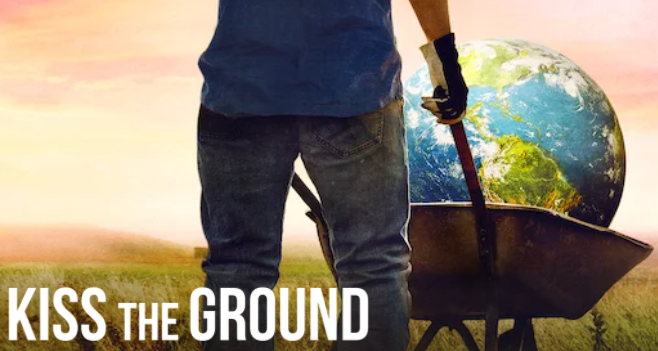Kiss the Ground
The Best Solution to Climate Change is Dirt Cheap
October 26, 2020
Climate change is, without a doubt, one of the most pressing issues that all of humanity currently faces. Scientists have spent decades researching its effects on the planet and how much longer we have left, while governments around the world sit idly and refuse to make necessary changes to improve Earth’s habitability. Of all the possible solutions, however, the one we’ve been overlooking the most is likely our best chance to reverse climate change. In fact, you’ve probably been walking on top of it for your entire life.
Kiss the Ground, a new documentary from Joshua and Rebecca Harrell Ticket, is an entertaining and informative overview of how the Earth’s soil can be used to slow carbon emissions. When plants absorb carbon dioxide and release oxygen through photosynthesis, massive amounts of carbon are stored in the ground. This allows both plants and microorganisms to thrive, creating healthier, nutrient-filled soil.
Because of the processes of industrial farming, however, large portions of the world’s soil is being reduced to dirt and dust. One of the most shocking facts of the documentary was that there are more microorganisms in every handful of healthy soil than the number of humans who have ever lived. Land tilling and pesticide spraying kills trillions of microorganisms, which not only harms the environment but reduces the productivity of the land as well.
In order for soil to store enough carbon from the atmosphere to reverse climate change, advocates of this practice explain that industrial farming must be completely reshaped and all other greenhouse gas emissions must be stopped. Given the world’s current political and social issues, this will be a monumentally difficult task; the good news is that, as shown in Kiss the Ground, farmers across the planet are utilizing ecologically-friendly techniques to grow crops.
By eliminating the use of pesticides and reducing tilling, farmers would be able to preserve the microorganisms in the soil. This could allow for the cultivation of a more diverse array of plant species that are high in nutrient value. Most importantly, these farming techniques can preserve soil for decades to come, as opposed to pesticides and tilling. In other words, industrial farming takes more work to get worse results.
Kiss the Ground outlines a shockingly simple, yet difficult to implement solution for climate change that the world needs to hear. It can’t be accomplished without the cooperation of farmers and the agreement of international governments, but when implemented it could potentially reverse climate change within two decades. Above all, the documentary serves as a hopeful reminder to look after our planet to maintain its habitability for future generations.

